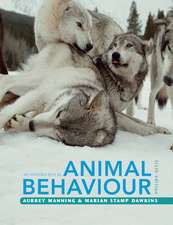Behavioral Lateralization in Vertebrates: Two Sides of the Same Coin
Editat de Davide Csermely, Lucia Regolinen Limba Engleză Paperback – 8 aug 2014
The chapters of this book concern the emergence and adaptive function of lateralization in several aspects of behavior for a wide range of vertebrate taxa. These studies span from how lateralization affects some aspects of fitness in fishes, or how it affects the predatory and the exploratory behavior of lizards, to navigation in the homing flights of pigeons, social learning in chicks, the influence of lateralization on the ontogeny process of chicks, and the similarity of manual lateralization (handedness) between humans and apes, our closest relatives.
| Toate formatele și edițiile | Preț | Express |
|---|---|---|
| Paperback (1) | 938.04 lei 43-57 zile | |
| Springer Berlin, Heidelberg – 8 aug 2014 | 938.04 lei 43-57 zile | |
| Hardback (1) | 944.06 lei 43-57 zile | |
| Springer Berlin, Heidelberg – 16 iul 2012 | 944.06 lei 43-57 zile |
Preț: 938.04 lei
Preț vechi: 1143.94 lei
-18% Nou
Puncte Express: 1407
Preț estimativ în valută:
179.50€ • 187.88$ • 149.40£
179.50€ • 187.88$ • 149.40£
Carte tipărită la comandă
Livrare economică 31 martie-14 aprilie
Preluare comenzi: 021 569.72.76
Specificații
ISBN-13: 9783642444807
ISBN-10: 3642444806
Pagini: 160
Ilustrații: VIII, 152 p.
Dimensiuni: 155 x 235 x 8 mm
Greutate: 0.23 kg
Ediția:2013
Editura: Springer Berlin, Heidelberg
Colecția Springer
Locul publicării:Berlin, Heidelberg, Germany
ISBN-10: 3642444806
Pagini: 160
Ilustrații: VIII, 152 p.
Dimensiuni: 155 x 235 x 8 mm
Greutate: 0.23 kg
Ediția:2013
Editura: Springer Berlin, Heidelberg
Colecția Springer
Locul publicării:Berlin, Heidelberg, Germany
Public țintă
ResearchCuprins
Introduction.- The Effect of Sex and Early Environment on the Lateralization of the Rainbowfish Melanotaenia duboulayi.- Lateralization in Lizards: Evidence of Presence in Several Contexts.- Advantages of a Lateralized Brain for Reasoning about the Social World in Chicks.- Avian Visual Pseudoneglect: The Effect of Age and Sex on Visuospatial Side Biases.- Lateralized Social Learning in Chicks.- Organizational and Activational Effects of Prenatal Exposure to Testosterone on Lateralization in the Domestic Chicken (Gallus gallus domesticus).- Navigating Through an Asymmetrical Brain: Lateralization and Homing in Pigeon.- The Right Hand Man: Manual Laterality and Language.
Textul de pe ultima copertă
Functional lateralization in the human brain was first identified in the classic observations by Broca in the 19th century. Only one hundred years later, however, research on this topic began anew, discovering that humans share brain lateralization not only with other mammals, but with other vertebrates and even invertebrates. Studies on lateralization have also received considerable attention in recent years due to their important evolutionary implications, becoming an important and flourishing field of investigation worldwide among ethnologists and psychologists.
The chapters of this book concern the emergence and adaptive function of lateralization in several aspects of behavior for a wide range of vertebrate taxa. These studies span from how lateralization affects some aspects of fitness in fishes, or how it affects the predatory and the exploratory behavior of lizards, to navigation in the homing flights of pigeons, social learning in chicks, the influence of lateralization on the ontogeny process of chicks, and the similarity of manual lateralization (handedness) between humans and apes, our closest relatives.
The chapters of this book concern the emergence and adaptive function of lateralization in several aspects of behavior for a wide range of vertebrate taxa. These studies span from how lateralization affects some aspects of fitness in fishes, or how it affects the predatory and the exploratory behavior of lizards, to navigation in the homing flights of pigeons, social learning in chicks, the influence of lateralization on the ontogeny process of chicks, and the similarity of manual lateralization (handedness) between humans and apes, our closest relatives.
Caracteristici
Provides an overview of the research on lateralisation in vertebrates
The chapters, arranged in phylogenetic order, cover almost all vertebrate classes from bony fishes to mammals
Stimulates future research in this topic
Includes supplementary material: sn.pub/extras
The chapters, arranged in phylogenetic order, cover almost all vertebrate classes from bony fishes to mammals
Stimulates future research in this topic
Includes supplementary material: sn.pub/extras

















